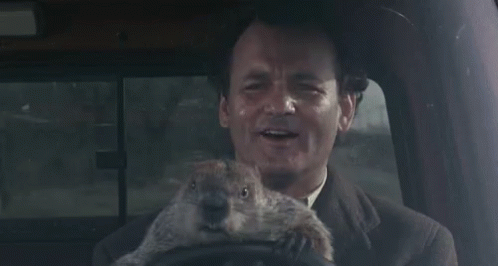James Ward is a lawyer, privacy advocate, and fan of listing things in threes. Nothing he says here should be considered legal advice/don’t get legal advice from social media posts. He promises he’s not as smug as he looks in his profile picture.
Any philosophy nerd will tell you that they loved the show The Good Place. It’s rare we’re able to find a safe space to talk about the Trolley Problem, or consider the Question of Evil, or hear Kierkegaard’s name pronounced (mostly) properly. It was a great show, and one that consistently did a good job of reminding people why thinking about the big problems is both extremely taxing and, hopefully, its own reward.
But it’s not the best pop culture meditation on ethics, morality, and the tie between what we do and unhappy outcomes. That distinction belongs to another, earlier effort: Groundhog Day.

Join the Waitlist
First of all, don’t criticize me for today’s post coming a week late, and not the actual Groundhog Day: nobody reads work blogs right when they come out, and it wasn’t until it was supposed to be February 3d that Phil Connors realizes he’s living the same day over again anyway. (Um…spoilers?) There are plenty of reasons to see Groundhog Day, if you haven’t: Bill Murray, Chris Elliot’s only good work until Schitt’s Creek, and Andie McDowell being, you know, Andie McDowell. More than this, though, Groundhog Day is, in my opinion, the best philosophical movie ever made, and arguably the only one to grapple with its subject matter in an accessible way (I’m looking at you, Ingmar Bergman). Everything from Aristotle to Camus to Nietzsche is in there. Even professional philosophers like it, and they don’t like anything.
One reason it’s so good is that it gives an insight into how difficult it is for anyone to break habits and patterns. Phil spends a good 2/3 of the movie being utterly awful in that utterly charming Bill Murray way, which is familiar enough to everyone. Repetition and daily churn sometimes create a feeling that there is no exit, just a loop that plays through. Even if that loop is self-created, anyone who’s tried to get into the right frame of mind about change will tell you that it isn’t easy. Just ask people how they're doing on their New Year's resolutions.

And….So What?
Why does talking about ethics, cyclical behavior, or weather-predicting rodents matter? Because habits and unchallenged assumptions make up a huge portion of how we think about the world and address problems. It’s evolutionary, in part: humans learned a long time ago to make fast decisions and to stick with what we’ve already learned unless we absolutely have to unlearn them. Sometimes that process is easy, when we learn as children that not everything that looks good to eat is good, and sometimes it’s harder, like when I rewatched 2 Fast 2 Furious and realized that maybe it isn’t our generation’s Citizen Kane. Either way, it’s only when we challenge assumptions and examine our typical mode of behavior (like in The Good Place or Groundhog Day) that we can understand if the cycle is self-created, and therefore if some of our problems are self-created too.
Okay, why does it really matter? Because people are, generally, just terrible at breaking bad habits and changing problematic aspects of our existence. And it’s something that has spilled over to our approach to the Internet. At this point, more people than ever understand the privacy risks of using Facebook, allowing location-tracking, and the like, but there’s virtually no evidence to suggest that we are making serious strides towards changing our behavior. And on the business side, it’s becoming ever clearer that users hate the creepier tracking, monitoring, and profiling tactics they’ve learned about, but everyone plenty of businesses and industry groups are doubling down on them (even if they say they’re moving in a different direction).
...it’s becoming ever clearer that users hate the creepier tracking, monitoring, and profiling tactics they’ve learned about...
Why is it so hard to move beyond these patterns? For one, they’re designed to be easy. The refrain of the last ten years has been “reduce friction, make it seamless,” by which we’ve meant “make it easy to just do exactly the same things.” Clicking “I Agree” or “Accept Cookies” is much, much simpler than going through the rigmarole of going to the cookie control center, scrolling through each use-case, selecting “no thanks” for each one, and doing so for every website. It’s designed to be complicated, in the same way that turning off location tracking services in many apps is intentionally complicated, and how privacy policies read like they were drafted in German, Google Translated into cuneiform, and then translated to English.
Another reason is that ethics are complicated. Consider the balancing act necessary to evaluate whether facial recognition technology is ethical when deployed in public spaces. Yes, of course it is, because it allows for identification of criminals, protection for lost children, and early-warnings for people with health problems more easily identified by algorithms! No, of course it isn’t, because it’s invasive, finalizes the creation of a surveillance state, and diminishes the right to exist without being objectified! Both of those statements are entirely true, simultaneously. So are the critiques and benefits of machine learning, social media, and the Internet generally. None of it boils down to a simple answer, which is the one thing almost everyone wants and almost never exists, no matter how many times we do the same thing on repeat.
Getting to February 3d
How do we get out of this cycle? A lot of it depends on what exactly we want to accomplish. Approaching the Problems Of The Internet™ as if they constituted a monolith will, inevitably, lead to a sense that there’s no way to change things. After all, the dominance of market players like Google or Facebook is so embedded in our economic system, our culture, and even our language (e.g., to “Google” or to “Instagram” as verbs) they can hardly be challenged. And forget about shifting our understanding of the gig economy, e-commerce, informational capitalism, and the like. Lions and tigers and bears, oh my.
That fatalist, pessimist view is exactly why it’s a mistake to think (exclusively) about the Big Problems first. Bill Murray didn’t break out of his Punxsutawney rut until he recognized that the broader circumstances (stopping the cycle life on repeat) were a product of individual decisions (catch the kid falling out of the tree, fewer donuts, stop being weird with Andie McDowell). Yes, sweeping change sometimes requires large scale action and activity, but it just as frequently comes as a result of changing minds and shifting fashions.

What does that mean when it comes to ethical uses and access to the Internet? A lot of small changes — selecting platforms that treat users fairly, limiting use of privacy-stealing technologies, taking the time to click “I Do Not Accept,” and the like. Some of these changes can, and should, be made easier by businesses that want to give you those options. For example, it’s entirely possible to engage with users and give them the choice about how much they want to be tracked or profiled. Even if some decide they want to be left alone, it’s possible to earn their respect and, perhaps, their repeat business.
Yes, sweeping change sometimes requires large scale action and activity, but it just as frequently comes as a result of changing minds and shifting fashions.
More than anything, breaking out of the unhealthy patterns of surveillance and exploitation (which, to be clear, benefit only a small number of businesses and virtually no consumers) is about taking the time to recognize that the patterns exist. Bill Murray at least had the unending strains of “I Got You Babe” to let him know he was in the same place, day after day, in Groundhog Day but our clues are much subtler. It takes consideration and a thoughtful abandonment of the “this is fine” mindset about how we interact with platforms, businesses, and one another to see where the actual problems lie. We don’t know how many days Phil Connors spent repeating February 2d, but the time and effort it took to change his approach to the day was worth it. For us, moving away from our unhealthy approach to data and privacy will certainly take time, and it won’t be easy. But it’s what we need to do if we want to transform the internet into a good place.

Join the Conversation
Join the waitlist to share your thoughts and join the conversation.
James Ward
James Ward is a lawyer, privacy advocate, and fan of listing things in threes. Nothing he says here should be considered legal advice/don’t get legal advice from social media posts. He promises he’s not as smug as he looks in his profile picture.
.png)